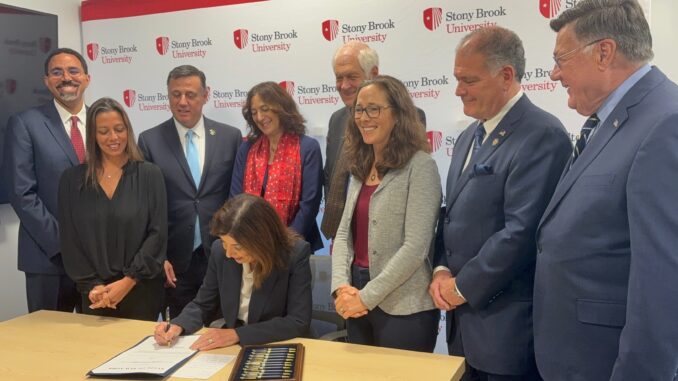
Governor Kathy Hochul has signed legislation allowing Stony Brook University to expand housing on its north shore campus. Sponsored by Sen. Monica R. Martinez (D-Brentwood) and approved unanimously by the state Senate in June, the measure will support the State University of New York’s flagship institution in fulfilling its growing role in education, research, and the regional economy.
The enacted legislation authorizes SUNY’s Board of Trustees to lease a portion of underdeveloped land on Stony Brook’s West Campus to the newly created Stony Brook Housing Development Corp. for the construction of undergraduate student, graduate student, faculty and staff housing. The project is expected to provide up to 1,900 new beds exclusively for members of the Stony Brook University community.
“This legislation gives Stony Brook the capacity to grow with the moment,” Martinez said. “Expanding housing for students, faculty, and staff will give the university the foundation it needs to welcome the talent that will push the boundaries of research, drive new discoveries, and strengthen our region’s economy.”
The bill signing took place as part of an event announcing $300 million in state funding to establish the Quantum Research and Innovation Hub at Stony Brook. The governor’s office said the new center will position Stony Brook as a national leader in quantum science and technology, supporting research that drives economic growth, strengthens national security and creates new opportunities across New York.
By providing new housing options, the legislation will help Stony Brook attract and retain the students, faculty and researchers needed to support this growth, fueling Long Island’s economy and advancing the state’s leadership in discovery.
Stony Brook University has long struggled to meet demand for on-campus housing, a challenge worsened by rising enrollment and catastrophic flooding in August 2024 that damaged two on-campus residence halls. The storm struck just before the fall semester, forcing the university to cancel move-ins, temporarily relocate students to hotels, and offer financial incentives to those giving up their rooms. Some students were also reportedly placed in triple-occupancy rooms at a discounted rate to address the housing shortage.

